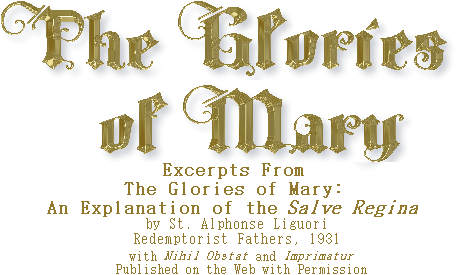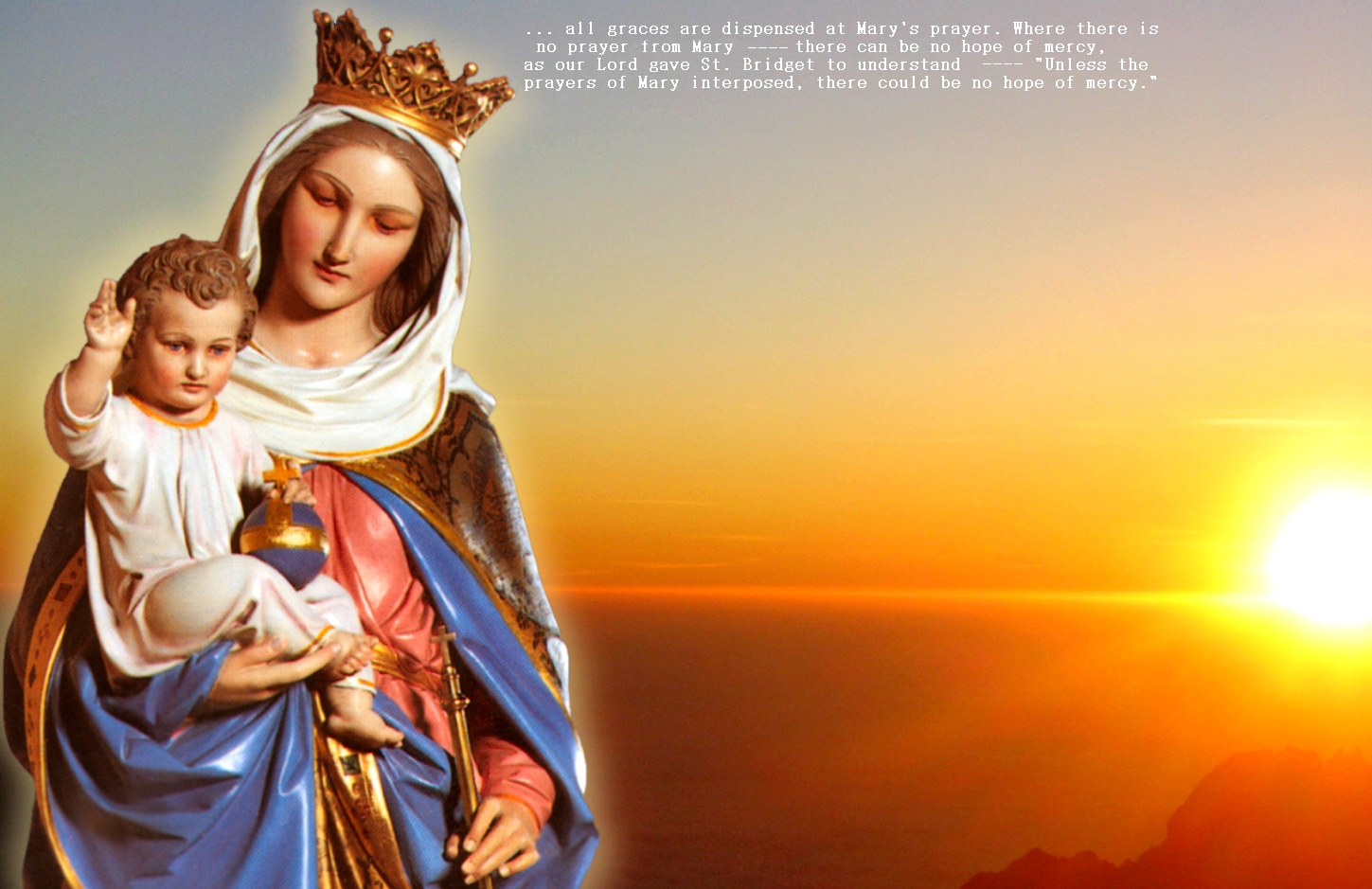|


CHAPTER
9
O
CLEMENT, O LOVING
The
Clemency and
Compassion
of Mary
REFERRING to our Lady's great
compassion for
sinners, St. Bernard calls her the Promised Land flowing with milk and
honey. And St. Leo tells us that, when he looks at her, he no longer
sees
God's justice but only His mercy, for Mary is full of the mercy of God.
She is like a fair olive
tree in
the field (Sir
24: 14). Only oil (a symbol of mercy) is extracted from the olive; only
grace and mercy flow from the hands of Mary.
Why is the fair olive tree
pictured
as standing
in the field, and not in some garden, enclosed with walls or hedges? So
that all can see her plainly, and get to her without trouble, to secure
the remedy for all their evils. 73
And what safer refuge can we
find
than the
compassionate heart of Mary? There the poor find a home, the sick a
cure,
the afflicted consolation, the doubtful counsel, and the abandoned
help. 74
We would be poorly off indeed
if we
had no
Mother of Mercy to attend to us all the time and relieve us in our
needs. Where
there is no woman, a person mourns who is in want (Sir.
36:27
----- Vulgate).
St. John Damascene comments:
"This
woman is
no other than the Most Blessed Virgin Mary. Wherever she is not, the
sick
person groans."
It must be this way, since all
graces are
dispensed at Mary's prayer. Where there is no prayer from Mary ---
there
can be no hope of mercy, as our Lord gave St. Bridget to understand
--- "Unless the prayers of Mary interposed, there could
be no
hope of mercy."
But perhaps you fear that Mary
is
not aware
of our needs, or has no feeling for them. Ah no; she sees and feels
them
far better than we do ourselves.
There is not one among all the
Saints who
can ever feel for us in our miseries, of body and soul, like this
woman,
the Most Blessed Virgin Mary. 75
The Roman historian Suetonius
relates that
the Emperor Titus was so eager to help anyone who came to him that,
when
a day passed without an opportunity to grant a favor, he used to say
with
regret: "I have lost a day."
Probably it was only vanity
that
made Titus
speak this way, or the desire for esteem, and not genuine charity at
all.
But if Mary , our Queen, had to pass a day without granting a grace,
she
could say what Titus said --- but
from a
genuine desire
to serve us, because she is full of charity.
Indeed, Mary is more eager to
grant
us graces
than we are to receive them. Therefore, no matter when we go to her, we
find her hands filled with generous mercies. 76
When the Samaritans refused to
receive Christ
and His doctrines, St. James and St. John asked Him if they should
command
fire from Heaven to fall on them and co sume them. But our Lord
replied: "You
know not of what spirit you are" (Lk 9:55
----- Vulgate).
Jesus as much as said: "I am so
tender and
merciful that I came from Heaven to save sinners, not chastise them,
and
you wish to see them lost. Fire indeed --- and
chastisement!
Speak no more of chastisement, for that is not My spirit."
So too in our Lady's case: her
spirit is the
same as her Son's, and we can never doubt but that she is all mercy. As
she said to St. Bridget: "I am called the Mother of Mercy, and it was
God's
mercy that made me so merciful."
A great sign appeared in the
sky,
a woman
clothed with the sun (Rv. 12: 1). St. Bernard says, "O Lady, thou
hast
clothed the sun, the Eternal Word, with human flesh, but He has clothed
thee with His power and mercy . . . "
" Mary is so compassionate and
kind
that when
sinners, no matter who they are, throw themselves on her charity, she
does
not investigate their merits, or consider whether they are worthy, but
she hears and helps all."
Therefore, St. Idlebert
remarks, she
is called as
beautiful as the moon (Song. 6: 10). She pours her light and favor
on all sinners, even the most unworthy, as the moon sheds her radiance
on all creatures.
And though the moon, says
another
writer,
gets all her light from the sun, yet she completes her cycle of work
quicker
than the sun ----- that is, what it
takes a
year for
the sun to do, the moon does in a month. So, according to St. Anselm,
we
often get our request more quickly by calling on Mary's name than by
calling
on the name of Jesus.
We may be afraid (as we said in
another place)
to go directly to Almighty God, because after all it is His infinite
Majesty
we have offended. But we should never be afraid of going directly to
Mary,
because we will find nothing in her to terrify us.
True, she is holy, immaculate,
and
the great
Queen of the universe. But at the same time she is also flesh of our
flesh,
a child of Adam.
Always keep in mind that our
Lady's
protection
is greater and more powerful than anything we can imagine. 77
How is it that the same God Who
was
so rigorous
in punishment under the Old Law now shows such great mercy topersons
guilty
of far greater crimes? He does it all because of His love for Mary, and
on account of her merits. 78
The world would have been
destroyed
long ago
if it were not for Mary's intercession. 79
And now that we have the Son as
Mediator with
the Eternal Father, and the Mother with the Son, we have full access to
God and can go to Him with absolute confidence, hoping for every good
thing
from Him.
For how can the Father refuse
to
hear the
Son, when He shows Him His side and His wounds, the marks of the
sufferings
He bore for sinners? And how can the Son refuse to hear His Mother,
when
she shows Him the breast that nursed Him? 80
Consider the following instance
of
the great
mercy of Mary. In the year 1604, in a city in Belgium, there were two
young
students who gave themselves up to a life of debauchery instead of
following
their studies.
One night they were at the
house of
an evil
woman; but one of the two, who was named Richard, stayed only a short
time
and then returned home. While he was preparing to retire, he remembered
that he had not yet said the few Hail Marys that were his
daily
practice.
He was very tired and half
inclined
to omit
them; nevertheless, he forced himself through the routine, saying the
words
half asleep and with no particular devotion. Then he lay down and fell
asleep.
Suddenly he was wakened by a
violent
knocking
at the door. The door was closed, but the figure of a young man,
hideously
deformed, passed through it and stood before him.
"Who are you?" Richard cried.
"You
do not
know me?" asked the other. "Ah yes, now I do," said Richard; "but how
changed,
with all the appearance of a devil!"
"Alas, unhappy creature that I
am,"
said his
companion, "I am damned! When I was leaving that house of sin, a devil
came and strangled me. My body lies in the street; my soul is in Hell.
"And know this
--- the
same fate awaited you, except that the Blessed Virgin spared you for
that
little act of homage of the Hail Marys. If you are not a fool,
profit
by this warning which the Mother of God has sent." He then opened his
mantle,
showing the flames and serpents by which he was tormented, and
disappeared.
Breaking into a
flood
of sobs
and tears, Richard went down on his knees to give thanks to Mary his
protectress.
Then as he pondered how to change his life he heard the bell of the
Franciscan
monastery ringing for matins. "It is there," he said, "that God calls
me
to do penance."
He went immediately to the
monastery
and begged
the Fathers to admit him. Since they knew his wicked life, they were
hardly
willing to do so. But sobbing bitterly, he told them all that had
happened.
And when two Fathers had been sent to the street and had found the
strangled
body, which was charred and blackened, they admitted him.
From that time on he led an
exemplary life
and at length went to preach the Gospel in India, and thence to Japan.
There he had the happiness of giving his life for Jesus Christ, being
burnt
alive for the faith at Nagasaki on September 10, 1622.
Let us conclude with St.
Bernard's
beautiful
and tender words:
"O Mary, thou art clement to
those
who need
thee, compassionate to those who beseech thee, sweet to those who love
thee! "Thou art clement to the penitent, compassionate to anyone
striving
for virtue, sweet to the perfect! "Thou art clement in working for us,
compassionate in giving grace, sweet in giving thyself!"

FOOTNOTES:
73.
Hugh of
St. Victor (?)
74.
Thomas
a Kempis
75.
St. Antonine
76.
Bernardine
de Bustis
77.
St. Germanus
78.
Author
of the Pomerio
79.
St. Fulgentius
80.
St. Arnold
Carnotensis
Continued
forward.
VIEW THE FULL IMAGE OF OUR LADY
 
HOME---------MARY'S INDEX---------E-MAIL
www.catholictradition.org/Mary/glories9.htm
|

